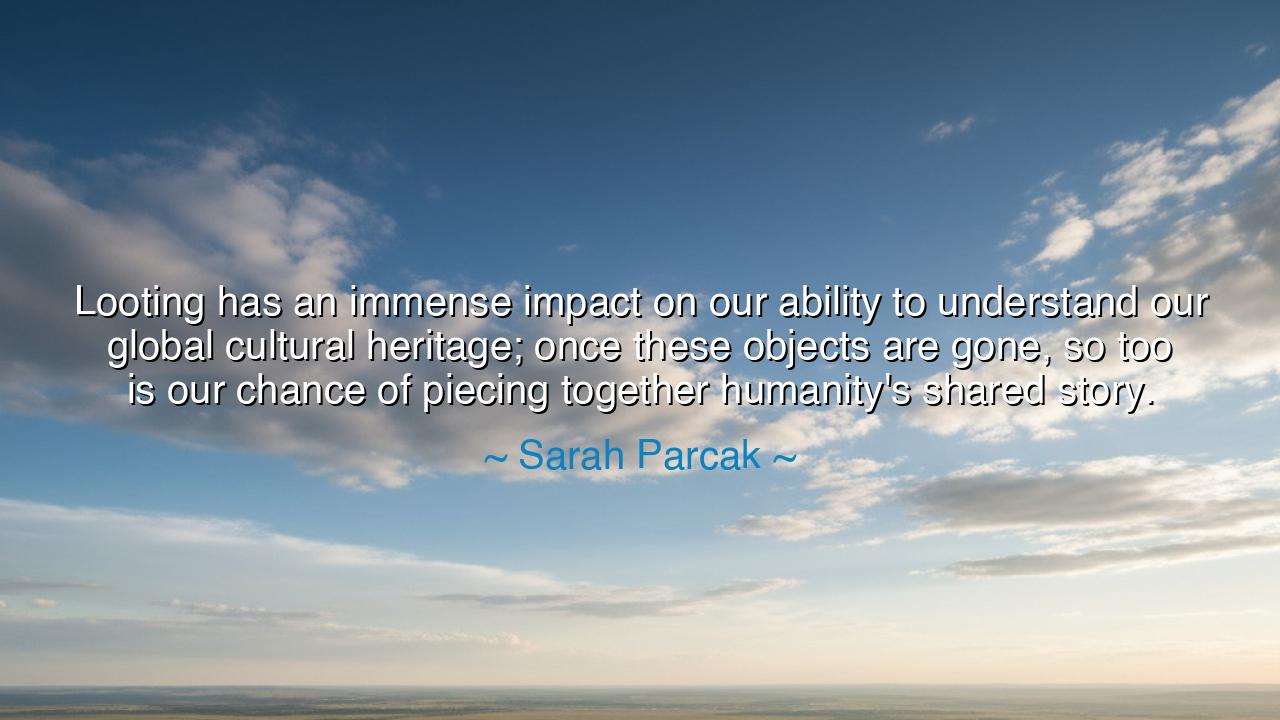
Looting has an immense impact on our ability to understand our
Looting has an immense impact on our ability to understand our global cultural heritage; once these objects are gone, so too is our chance of piecing together humanity's shared story.






"Looting has an immense impact on our ability to understand our global cultural heritage; once these objects are gone, so too is our chance of piecing together humanity's shared story." These powerful words from Sarah Parcak strike at the heart of a profound truth: that the theft of cultural artifacts—the looting of the very symbols of our shared history—is not just a crime against a nation, but a crime against humanity itself. When we remove the tangible remnants of the past, we erase the opportunity to understand who we were and, by extension, who we are. These objects, these pieces of the past, are not mere relics; they are the keys to unlocking the stories of our ancestors, the lessons they sought to pass down, and the mistakes they made so that we might learn from them.
From the earliest days of recorded history, cultural artifacts have served as vessels of memory. Consider the ancient Sumerians, whose cuneiform tablets documented not only the laws of their civilization but their very understanding of the universe. Without these inscriptions, much of what we know about Sumer and its influence on the world might have been lost forever. Similarly, the Egyptian pyramids and the treasures buried within them speak of a civilization that, despite its passage into the sands of time, still holds invaluable secrets about human ambition, faith, and creativity. These remnants, these tangible memories, allow us to trace the path of humanity’s journey, to see how we’ve evolved, struggled, and thrived over millennia. But when these objects are looted—taken from their rightful place in history—they slip through our fingers like water, and with them goes the chance to piece together the fabric of our collective story.
Let us not forget the tragic looting of the Palmyra ruins in Syria. When ISIS tore through this ancient city, once a jewel of the Roman Empire, they destroyed priceless monuments and stole irreplaceable artifacts. These acts of violence were not merely physical assaults on stone and clay; they were assaults on the very heart of civilization. The sculptures, the reliefs, the sacred texts that had stood for thousands of years—each one told a story, a story that linked past generations to those who walk the earth today. When we lose these objects, we lose the chance to understand our history in its fullness. The shared heritage of humankind is diminished, and we find ourselves further adrift in a world that feels more disconnected, more fragmented.
This theft of cultural treasures is not a new phenomenon. The British Museum, with its vast collection of looted artifacts from Egypt, Greece, and India, has long been the subject of debate. Among the most famous examples are the Elgin Marbles, taken from the Parthenon in Athens. While these masterpieces of Greek sculpture have been revered by many, the question of their rightful ownership remains a poignant reminder of the past's complex legacy. These marbles, like so many objects of cultural significance, belong not just to one nation or people, but to humanity as a whole. When they are taken from their context, their true meaning becomes obscured. We may admire them in a museum, but we lose the chance to understand them as part of a larger, shared history—a history that, once fractured, cannot be fully restored.
The lesson to be drawn from the words of Sarah Parcak is clear and powerful. Every object that is looted represents not just the loss of material wealth, but the loss of meaning, of connection to our past. To steal or destroy a cultural artifact is to sever a thread in the vast tapestry of our collective story. These objects are more than just relics; they are the echoes of human experience, and when they are removed, we lose the chance to piece together the moments that define us. Our shared heritage is built upon these fragments of the past, and without them, we risk losing sight of who we are and where we have come from.
In our modern world, where information is so readily accessible, it is easy to overlook the value of these tangible pieces of history. But we must remember that the artifacts of the past are not just material objects—they are the soul of civilization. As guardians of this world, we must protect these treasures, not just for ourselves, but for the generations to come. We must demand that they be returned to their rightful homes, preserved for the benefit of all humankind. And just as importantly, we must educate ourselves and others about the true value of cultural heritage, for it is only through understanding and reverence that we can ensure these stories continue to be told.
The practical action we can take begins with respect—respect for the objects that tell our story, respect for the cultures that have passed them down, and respect for the future generations who will look to us for guidance. We must stand firm in our commitment to protect and preserve the heritage that has been entrusted to us, for it is through these efforts that we can ensure the continued connection between the past, the present, and the future. Let us honor the work of archaeologists, scholars, and cultural custodians who fight to preserve the treasures of the past, for in their labor, we see the path to a future that is informed by the wisdom of those who walked before us. Let the looting cease, and may we work together to piece together the rich, vibrant story of humanity’s shared journey.






AAdministratorAdministrator
Welcome, honored guests. Please leave a comment, we will respond soon